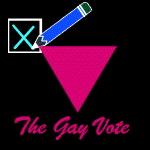 |


7% in Mid-Sized Towns Power of Gay/Lesbian/Bisexual Vote in New Report Key States will Have Impact on Year 2000 Elections |
|
Compiled By GayToday
 New York, New York--The gay, lesbian and bisexual (GLB) electorate in the
United States is large and powerful enough to tip the scales in both
hotly contested Congressional elections and in close elections in key
states such as California, a report released Monday by the Policy
Institute of the National Gay and Lesbian Task Force reveals.
New York, New York--The gay, lesbian and bisexual (GLB) electorate in the
United States is large and powerful enough to tip the scales in both
hotly contested Congressional elections and in close elections in key
states such as California, a report released Monday by the Policy
Institute of the National Gay and Lesbian Task Force reveals.
Overall, the GLB vote was 5 percent of the electorate in the 1996 election. In cities of more than half a million inhabitants, 9 percent of voters self-identified as GLB, while in medium-sized cities (50,000 to 500,000 inhabitants) GLB voters comprised 7 percent of the electorate. The report, entitled Out and Voting II: The Gay, Lesbian and Bisexual Vote in Congressional Elections, 1990-1998 is an expanded and more comprehensive update of a report first released two years ago. The new report includes data from the 1998 elections and also takes a concentrated look at the GLB electorate in California. The report was authored by Robert W. Bailey, Ph.D., a political scientist at Rutgers University. It is published by the NGLTF Policy Institute, a think tank dedicated to research, policy analysis, strategy development and coalition building to advance the equality and understanding of gay, lesbian, bisexual and transgendered (GLBT) people. "California will play a crucial role in the election of the next president and the composition of the next Congress," said NGLTF Executive Director Kerry Lobel. "The GLB electorate in both California and across the nation is sizable and independent. This electorate, bolstered by the increasing number of voters who support equality for GLBT people, has the power to tip the balance in the year 2000 elections." Some of the major findings of Out and Voting II include:
The report found that the GLB electorate in California is sizable, progressive and independent. "In recent years, it has been a key constituency in the victorious campaigns of its two U.S. Senators and its new Governor, helping to shift the balance of power in the Golden State from Republicans to Democrats," Out and Voting II author Robert Bailey found. "GLB voters in California will continue to play a pivotal role in the 2000 elections, helping decide who will represent California in Congress and who will reside in the White House." The report also found that while the GLB electorate is particularly strong in large cities - nearly 9 percent in cities with populations exceeding half a million inhabitants - it is also strong in mid-sized cities. In cities with populations ranging from 50,000 to half a million, 7.2 percent of the electorate is gay, lesbian or bisexual. In small towns and suburbs, GLB people are about 4 percent of the vote. "This figure is particularly telling, given the number of hotly contested House races that are in or around small- to mid-sized cities," Lobel said. "The Democrat and Republican Parties ignore the GLB vote in these races at their peril." Indeed, the report found that at the time of the 1998 mid-term elections, 61 percent of GLB voters lived in a congressional district represented by a first-term Republican. "Not only is this a vote that can help Democrats recapture seats, but GLB voters in general live in swing districts that Democrats will need to preserve," Bailey found. "Identifying competitive Congressional House districts where there are substantial GLB voters and then mobilizing these voters for Democratic candidates could be a crucial factor in recapturing a Democratic majority in the House. "The transfer of a few seats in the House in the 2000 elections would result in a change in Congressional leadership away from members who have publicly identified themselves as unsupportive of the lives of GLBT Americans," the report concludes. "A systematic strategy of voter mobilization in key districts would give the emerging GLB electorate the clout that its numbers suggest it deserves." Out and Voting II may be downloaded for free by visiting www.ngltf.org/pub.html or may be purchased for $10 by calling 202-332-6483, ext. 3205. |

